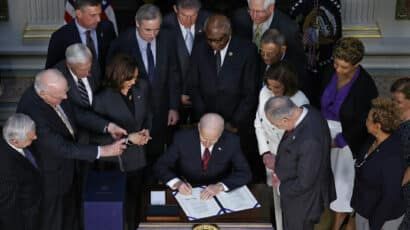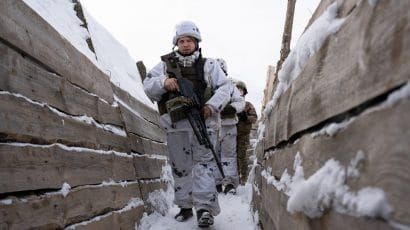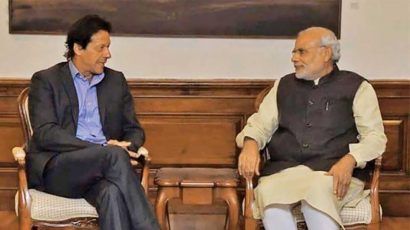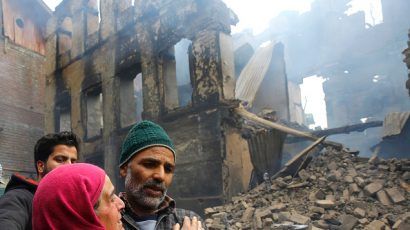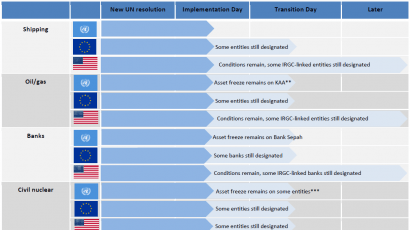Search results for nuclear terrorism
Drone warfare: The death of precision
When it comes to drone strikes, the Trump administration is playing by a new set of rules that could prove dangerous for US intervention in foreign conflicts.
Turning down the heat between India and Pakistan
The United States has a new best friend, India, and that friend would like the White House to stabilize the subcontinent by putting more pressure on Pakistan to deescalate tensions.
NATO-Russia relations after the Newport Summit
The possible long-term prospects, and how to improve them
The argument for a hypersonic missile testing ban
A ban on the testing of hypersonic missiles would place a roadblock in the path of a destabilizing, technology-driven arms race
Negotiating with Iran: Expectations for Baghdad
The only visible achievement of the talks between the major powers and Iran in Istanbul in mid-April -- 15 months after the previous round had been pronounced a failure -- was agreement to meet again in Baghdad.
Are US threat assessments outpacing the military threats America actually faces?
The Pentagon has consistently exaggerated its estimates of threats the United States faces. The clearest example of this strategy of exaggerated threat estimation is 20 years of failed “War on Terror,” but it continues today in massive military budgets aimed at preparing for "great power conflict."
China and the United States: It’s a Cold War, but don’t panic
In November 2019, Henry Kissinger warned that the United States and China were in “the foothills of a Cold War” that could end in a conflict worse than World War I. Two years, one pandemic, and a change of American administrations later, the relationship is above the foothills and nearing the summit. Cold War framing now seems inevitable. It has, at least, the virtue of focusing the world’s attention.
How the demise of an arms control treaty foreshadowed Russia’s aggression against Ukraine
The dismantlement of the European security architecture began with the erosion of its arms control treaties.
After Geneva: Will Self-Interest Suffice?
In Geneva, President Joe Biden said that future cooperation with Russia would be based not on trust but on US self-interest. If Putin thinks the same way, the two might cooperate so long as doing so appeared to be in their self-interest. But can far-reaching security accords be signed and implemented without mutual trust?
India, Pakistan, Kashmir: Taking the war option off the table
On September 27, Prime Minister Narendra Modi of India and Prime Minister Imran Khan of Pakistan will address the United Nations General Assembly in New York. This appearance will come at a time of great concern about the increasingly hostile relationship between their two countries. Now is a good time to resurrect an old idea proposed at various times by both India and Pakistan but never fully agreed: a binding commitment never to resort to war to settle their disputes.
Another India-Pakistan crisis
Why have Pakistan and India gotten themselves into this disastrous situation—a conflict whose escalation they cannot control, both sides armed with weapons that mean misjudgments lead to the death of nations.
Putin’s wish list does not include destroying Trump
The much-anticipated summit in Helsinki is over and US media and politicians are fuming over Trump’s admiration of the persuasive skills of President Putin. Even though Trump’s performance during the press conference may have played to the Russian side, it is unlikely major Russian goals for the summit centered on making the US president look … Continued
The Iran deal is a done deal
Trump’s unilateral decision about the Iran deal has put the EU in a bind, from which it will likely prove hard to escape.
The persistence of the radioactive bogeyman
Since 1950, a remarkable number of American and European horror movies have used radiation as a central plot device. It is a rich, if not distinguished, history. In fact, it is a mostly miserable history, full of bad production values, bad plots, and bad acting. But that doesn’t mean these radioactive B-movies are unimportant. They reflect the fears and misconceptions of their era as they relate to scientific advances—and scientific arrogance.
Hardly the hermit kingdom: New report reveals North Korea’s global reach
A new expert report provides a blueprint for combatting Kim Jong-un's global criminal enterprise.
Modest but meaningful steps to prevent proliferation in Turkmenistan
This five-year plan to address security gaps in Turkmenistan starts with a better-trained border patrol and adoption of European Union export controls.
How the United States benefits if Iran’s economy booms
Will lifting sanctions on Iran have the desired effect?
What the Iran deal means for blacklisted entities
Sanctions relief is easier said than done. A lot easier.






